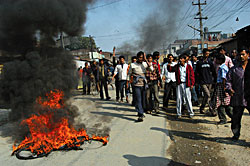 MIN RATNA BAJRACHARYA |
Two years after the Madhes movement altered Nepali nationalism, the Tarai is in a mess.
Anger against Kathmandu was the defining feature of this period. Now, a mix of disillusionment, rage, helplessness and fear prevails. Macro politics in the region is more fragmented than ever, across party and caste lines. And at the micro level violence has become the only tool to resolve both political and personal disputes.
In terms of party politics, the MJF managed to prevent a split this week. All leaders realised they needed each other (Upendra needs Gachhedar's Tharu base and JP's manipulative skills, and both recognise that Upendra remains the face of the Madhes movement).
All this is happening as the polarisation in national politics deepens. With inter-party relations improving somewhat in Kathmandu, the mood at Bhadrakali, Maharajganj and Lainchaur will continue to determine MJF realignments.
The TMDP has begun protests demanding implementation of the eight-point agreement. Apart from a few committed activists, people are in no mood to come out into the streets. But this is a chance for the party to expand its organisation and caste base, get its leaders out into the Tarai and occupy the moral high ground.
There is a churning among the armed groups. The government talks drama has had a few unintended consequences: intermediaries have made money, ragtag groups have gained legitimacy, some serious groups have been forced to introspect and the security situation has become even weaker with the police told not to upset the process.
There are mixed signals about the unification of the three armed groups. Goit, Jwala and Pawan's representative, Azad, did meet in Patna last week to get together but whether this translates on the ground is to be seen. All three are planting different versions of the meeting.
Jwala unilaterally issued a statement saying Goit would be a 'ceremonial' head, Pawan deputy chairman, while he would be general secretary and the military commander. Goit immediately refuted the statement. Pawan's other representative, Kautilya, who has been talking to the government, rejected the efforts. Either Pawan is playing both sides (talking to the state while strengthening the armed movement) or has a genuine problem balancing the contradictory impulses within.
If all this is not confusing enough, add the Maoist and Matrika dimension. The biggest challenge for the Maoists would be a cohesive Madhes. The present fragmentation gives them ample opportunities to play off one against the other. Control of the state apparatus has allowed them to build links with key actors, both mainstream Madhesi leaders and militants.
Matrika is a maverick but not a fool. He realises that there is a political vacuum in Madhes with people unhappy with the state, Maoists, Madhesi parties and armed groups. He wants to set up a party that would allow him to get rid of the Maoist baggage but snatch away their landless base, besides tapping into the loyalties of other Yadavs. While some believe this is an elaborate Maoist ploy to set up Matrika as a radical face in Madhes by distancing themselves in public, others believe Matrika is too much of anarchist to become a cog in such a conspiracy.
And where does the Kathmandu establishment stand in all this? It is either totally insensitive or incompetent or is deliberately letting this fester. In their jumbo central committee, the unified Maoist party has less than a dozen Madhesi members. Think of the message this sends to the Tarai.
The presence of so many groups, with mixed motivations, will neither help the Madhes cause nor will it help the state assert its authority. Policymakers will end up prescribing easy solutions to increasingly intractable problems
Growing rage and discontent will translate into semi anarchy, ethnic and caste clashes, silencing of moderates and a continued call for secession from some quarters.
What Kathmandu can do is appoint a credible minister or task force for Tarai affairs that supervises developments there 24/7 - political grievances, local killings, micro disputes, administrative weakness, agreement implementation. Full time, sensitive, and sincere engagement with the plains is the only hope.



